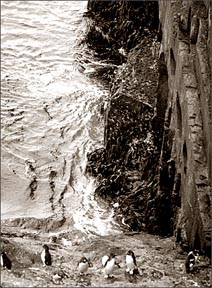|
Falkland Islands:
Favoured wildlife destination
Although many people hadn't heard of the Falkland Islands, or the
Islas Malvinas, they became a world headline in early 1982 when
Argentine forces invaded the islands in the latest surge of sovereignty
issues between Argentina and Great Britain. For a few months, the
Falklands War was in the news, then once the war was over, more or less
faded from view.
 Now, however, the Falklands are a becoming a favored destination spot
with wildlife conservationists, birders, those who favor unusual
locales, military buffs and those who'd like to get away from it all.
So, where are the islands? Now, however, the Falklands are a becoming a favored destination spot
with wildlife conservationists, birders, those who favor unusual
locales, military buffs and those who'd like to get away from it all.
So, where are the islands?
"The Falkland Islands are a group of islands in the south Atlantic.
The two main islands, East Falkland and West Falkland, lie 300 miles
[480 km] east of the Argentina coast.
About 200 smaller islands form a total land area of approximately
4,700 square miles (12,200 square km).
The capital and only town is (Port) Stanley. The government of the
Falkland Islands administers the British dependent territories of South
Georgia, the South Sandwich Islands, and the Shag and Clerke rocks,
lying from 700 to 2,000 miles (1,100 to 3,200 km) to the east and
southeast of the Falklands. The total population of the islands in 1991
was estimated at 2100." (Chronicle of the Falklands / Malvinas)
Background
You'll be dividing your time between Stanley on East Falkland, the
center of business and government, and the rest of the islands, referred
to as "camp." Stanley was founded in 1845, after the islands had been
traded back and forth between Argentina, France, and England.
It was to be a supply depot on the long sea voyage between Cape Horn
and Europe but fell into disrepute when ships putting into port were
damaged or scuttled. It was then the shipping point for the wool trade
with Great Britain and remains so today.
It is also now used by the Asian and European fishing fleets and the
center of a conservation effort to preserve and protect the islands
wildlife. Stanley faces north, to take advantage of the sun, and the
brightly painted roofs offer a colorful contrast to the surrounding,
almost treeless moors.
To many, Stanley looks like a bit of England plunked down on a
far-away island. It spreads around the harbor, with most of the
businesses and government houses within a short distance of each other.
Cape Pembroke Lighthouse is a good walk, but worth it for lighthouse
buffs to see the recent restorations. Stanley, the only town on the
islands, is small, walkable and friendly. There are no traffic lights
and no neon signs, but there are plenty of pubs and shops. Be sure to
buy some woolen goods, or the stuffed animals representing the local
wildlife.
The two main hotels, Malvina House Hotel and Upland Goose Hotel, are
here, as are the tour operators and the Falkland Islands Tourist Board
offices. Camp is becoming more accommodating to tourism, and there are
lodges, cottages for rent, or rooms in private homes.
The main industry in camp is raising sheep. Lamb (mutton) and local
fish are staple foods. Because of the isolation, the islands grow their
own foodstuffs in hydroponic gardens, and do so organically. You'll find
fast-food and snack shops, pizza and fish and chips.
The better restaurants are in the hotels.
You'll be using the Falkland pound. Visa and Mastercard are widely
accepted. There are no ATMs. You'll also see British currency in use.
When to go
In spring and summer, from October to March, the long daylight hours
give you ample time to sightsee or to observe the huge numbers of
migratory birds and marine mammals on the beaches and headlands.
You'll need warm, waterproof clothing and shoes or boots, and be
prepared for strong winds. If you are staying in camp, you might need a
sleeping bag. Hikers will need a good tent. If you plan to hike in camp,
be sure to get permission to camp on private land.
|
